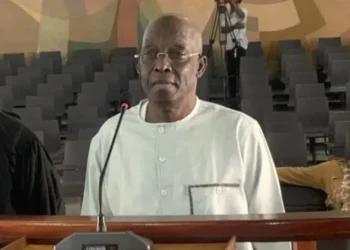Kenyan President William Ruto announced on Wednesday, June 26 that he will not sign into law a contentious finance bill proposing new taxes, following a day of intense protests that resulted in multiple fatalities.
President Ruto acknowledged that the bill had caused “widespread dissatisfaction” and stated that he had listened to the people’s concerns and decided to retract the bill.
This development represents a significant setback for Ruto, who ascended to power with promises to alleviate the economic pressures on Kenyans but has faced strong opposition to his latest reform efforts.
“It is necessary for us to have a conversation as a nation on how to manage the affairs of the country together,” President Ruto emphasized.
The aftermath of the protests left Nairobi, the capital, enveloped in the lingering scent of tear gas, with military personnel visible on the streets.
The demonstrations, which saw thousands of people storming parliament in a bold act of defiance, led to at least 22 deaths, according to a human rights group.
President Ruto described the deaths as an “unfortunate situation” and extended his condolences to the victims’ families.
While Nairobi has witnessed protests in the past, activists and observers warned that the current unrest carries greater risks.
On Tuesday, President Ruto vowed to suppress the unrest “at whatever cost,” even as further protests were planned for Thursday at State House. Soldiers patrolled the streets alongside police, who faced accusations of shooting several demonstrators on Tuesday.
The protests have united Kenyans across tribal and other divisions in a youth-led movement to prevent the finance bill from becoming law.
Although there were no reports of violence on Wednesday, an atmosphere of fear persisted. Civil society groups reported abductions of individuals involved in recent protests and anticipated more such incidents.
Tensions Rise Amid Unpredictable Protests
Herman Manyora, an analyst and professor at the University of Nairobi highlighted the dynamic nature of the situation.
“We are dealing with a new phenomenon and a group of people that is not predictable. If it would have been the normal demonstrations, I’d say it would fizzle out with time, but we don’t know whether these people will fear the army.”
Herman Manyora

Manyora noted that President Ruto missed an opportunity to calm tensions during his national address on Tuesday night. Instead of adopting a more conciliatory approach, the president’s speech was perceived as stern and uncompromising.
“We expected him to appreciate the gravity of the issue and empathize with the young people,” Manyora said. “Instead, people saw an angry president who is reading a riot act to the nation.”
Many young people who supported Ruto’s election, drawn by his promises of economic relief, now oppose the painful reforms.
The protests led to part of the parliament building catching fire and clashes erupting in several communities beyond the capital.
The Kenya National Human Rights Commission reported that 22 people were killed, 300 were injured, and 50 were arrested during the protests. Roseline Odede, the commission’s chairperson told the media.
Edith Wanjiku, the mother of a teenager killed during the protests, called for the arrest and prosecution of the police officers responsible for her son’s death. “He had just completed school and was peacefully protesting,” she said.
On Wednesday, authorities cordoned off Parliament, City Hall, and the Supreme Court with tape reading “Crime Scene Do Not Enter.” Police reportedly fired over 700 blanks to disperse protesters in the Nairobi suburb of Githurai overnight, with videos of the gunfire circulating online.
“My plea to the president is to listen to us and understand that this financial bill they want to pass is not as important as people’s lives,” said Gideon Hamisi, a businessman in Nairobi.
“Many young people lost their lives yesterday. I am a young man, and I feel deeply pained by what transpired.”
Gideon Hamisi
Opposition leader Raila Odinga condemned the use of force against protesters and called for dialogue, asserting that Kenya’s constitution had been effectively suspended.
“Kenya cannot afford to kill its children just because the children are asking for food, jobs, and a listening ear,” Odinga stated.
READ ALSO: GSE Launches OTC Market for Unlisted Rural Banks and SMEs





















